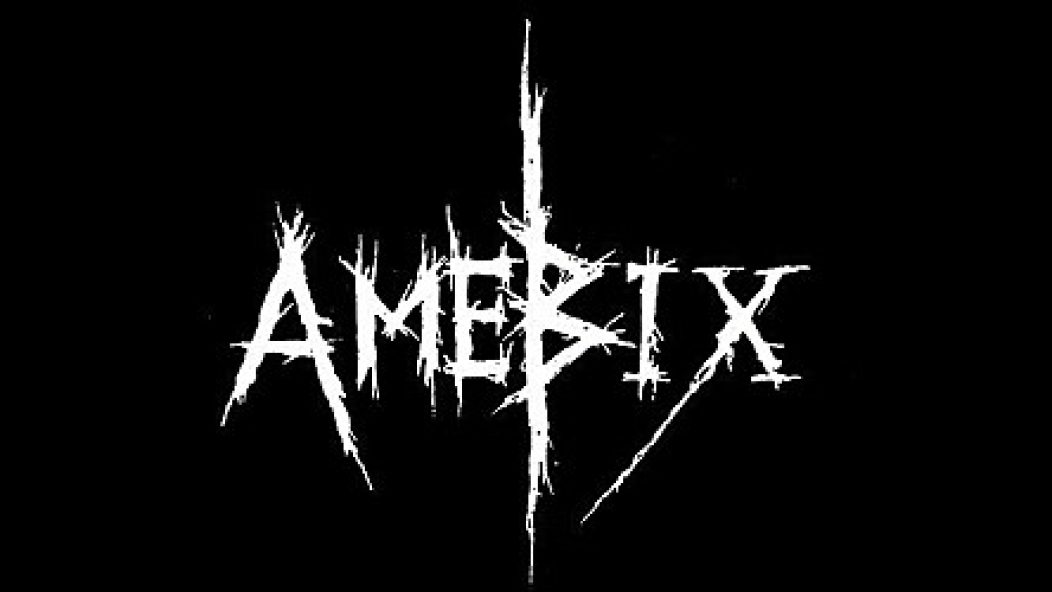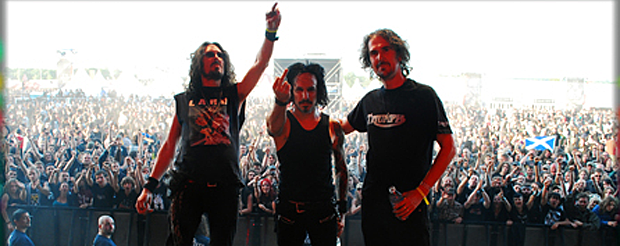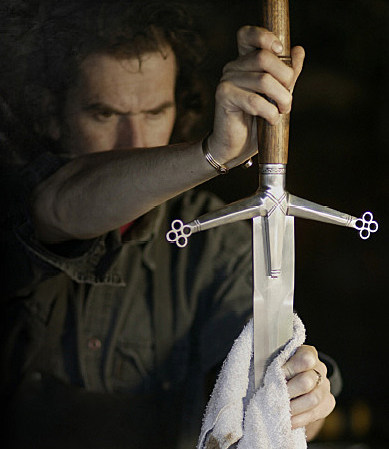
Interview: Amebix

. . .
Amebix are one of those bands who were rarely seen but often cited. They began in 1978 during one of England’s most difficult economic periods, and their music portrayed the era’s dire means through allegories of ancient warrior clans taking arms against giant and nebulous foes. In the process, Amebix also unwittingly helped spearhead the crust punk movement, though apparently they’re not all that thrilled about it.
After over 20 years of inactivity, Rob “The Baron” Miller and his brother Stig have resurrected the band once more, and they plan to reap the benefits of being genre godfathers. They’re touring again, they re-recorded some old classics, and they’ve even got a new album in the works. Rob Miller spent his two-decade break living on the Isle of Skye and becoming a world-class swordsmith, so he’s had a lot of time to think about what Amebix are about and what they need to become.
. . .
What inspired the return of Amebix after such a long period of dormancy?
It was the culmination of the Risen DVD project. There was no intention of playing again on the part of either Stig or I. But we decided to try and re-record some songs as an epitaph, really, to complete the cycle, and see how they would have sounded if we had access to better equipment.
Roy [Mayorga, drummer] joined the band in order to complete the project, but we all just seemed to gel together so well. The music was better than ever, and it really made us have to reconsider the position again. Being given the chance to play good venues to great crowds was a sort of vindication of having spent all our time in relative obscurity the first time around.
By the same token, what made you decide to re-record your classic songs? Did you have any reservations about offending the purists?
We wanted to summarize the “career” by choosing songs from each of the phases of the band, with “Winter” representing the 1981 Bristol scene, “Arise” being the emergence of Amebix from the City and into a more cohesive group, and I always loved “Chain Reaction” as an intense powerful song with a very positive lyric.
I can see how purists may prefer the originals; it’s the same with any band. Old Sabbath is great – primitive as hell, though, compared to subsequent recordings. But we have really opened the songs out and breathed new life into them, I think. [Ed. note: The result is the Redux EP; sample below, ordering information here.] I don’t think we will be returning to any other old material after this. That was an exercise that has been completed to our satisfaction.
“Winter” from Redux
[audio:AMEBIX_WINTER.mp3]
At this point, Amebix seem to be cited by metal bands as often as punk bands. Monolith in particular seemed to be a nod to both sides of the fence. Aside from a defiant attitude, what would you say that punk and metal have in common? How is that gap bridged?
At the time we were playing heavy music to a predominantly punk audience, it was really not very well received. It’s only really in retrospect that I became aware that we did have an influence. When I disappeared to Skye I didn’t listen to any music, so bands like Sepultura or Neurosis were totally unknown [to me] until fairly recently.
I think what we achieved that unites the two camps is a musical intensity coupled with an intelligent lyrical approach, and the ability to engage people within a landscape.
What do you think of modern metal? Do you listen to any of it?
I don’t listen to much new stuff. I really should. What does turn me off is the similarity of a lot of bands, and the reluctance to try new ideas. The punk scene in the ’80s became bogged down with a sort of self-censorship and as a consequence lost the original impetus, which was to manifest whatever you want. I would really like to hear a newer band that turns my head around, and certainly they will be out there. I just need to get more engaged with looking for new music and not be so stuck in my ways. The band’s content has always delved into bygone eras of the warrior ethos as much as political or social issues.
From where do you derive this inspiration? Does being Scottish have anything to do with it?
I am not Scottish, just through ancestry, but we grew up with a gunsmith as our father and were always surrounded by militaria. I also had a great enthusiasm for history as a child and a love of old stories and myths.
Additionally, would it be accurate to say that Amebix’s fixation on the primordial is a metaphor for surviving and overcoming in the modern age?
That is a fair comment. I think our ideal was to put people back in touch with their more instinctual nature, and the bigger world of the unconscious, too; to write stories that would act as visualizations and hopefully bring people towards a personal empowerment.
. . .
. . .
These same lyrical ideals are part of your daily life as a swordsmith. How did you get into that line of work? What is your favorite part of the process? It seems like it would be very satisfying.
It’s a great job. I never meant to do this as work, it was just a line of inquiry after I disappeared about 20 years ago. I just turned up on the Island and decided I wanted to know how to forge a Sword. I think it is psychologically the same as the work with Amebix – bringing to life vital symbols from the unconscious that resonate on a primal level.
The sword is very important in this respect. It became enlightening to realize that the process was alchemical, too, and that it uses all four elements. To forge a sword works on many levels, depending how you wish to engage with it. I love the whole of the job, apart from grinding which is tedious, but i do get to be a jewelry maker, leatherworker, and woodworker for all the different aspects of the work, so I’m constantly learning and never bored.
Your band is regarded as one of the godfathers of the crust punk movement. Obviously, you’re not living in squats or garbage picking food anymore. With that in mind, do you still feel a sense of connection to that life and the crust movement in general?
There was no “crust” genre when we were first around. We referred to ourselves as being crusty, really in appearance, and because of the lack of rudimentary facilities when living on the streets. It was strange to find that we had been classified as a particular genre in our absence. I am not happy about this at all. It seems that Amebix becomes “ghettoized” by association, when we were not living as a fashion statement. It was just how things were. I am aware that a lot of people are also put off even listening to the band because of this association, which is not good. Amebix is Amebix, as Motörhead is Motörhead or Killing Joke are Killing Joke.
Amebix has just announced a new album in the works. What can fans expect in terms of similarities and differences between the new and old material?
I hope that people will be disturbed. So far we have six recorded songs which are really strong, and the album looks to be taking shape as a real listening work. It will require engagement from the listener, not a shuffle selection. It has moments of delicate melody as well as paint-stripping ferocity. Lyrically it’s more focused than before. We are unhindered by not having to answer to anyone. I hope this will stir up a lot of reaction.
Given the current state of the world with global financial failures and precarious ecological circumstances, would you say the band is more relevant than ever?
Perhaps. Maybe we need to re-evaluate our lives at a basic level when times are harder. Amebix always arrive like a breath from the Angel of Death.
. . .











![Bad Omens announce new album CONCRETE JUNGLE [THE OST]](https://www.altpress.com/wp-content/uploads/2024/04/17/BadOmens-CROP_2024_JW_0619_Final_V1.jpg)
